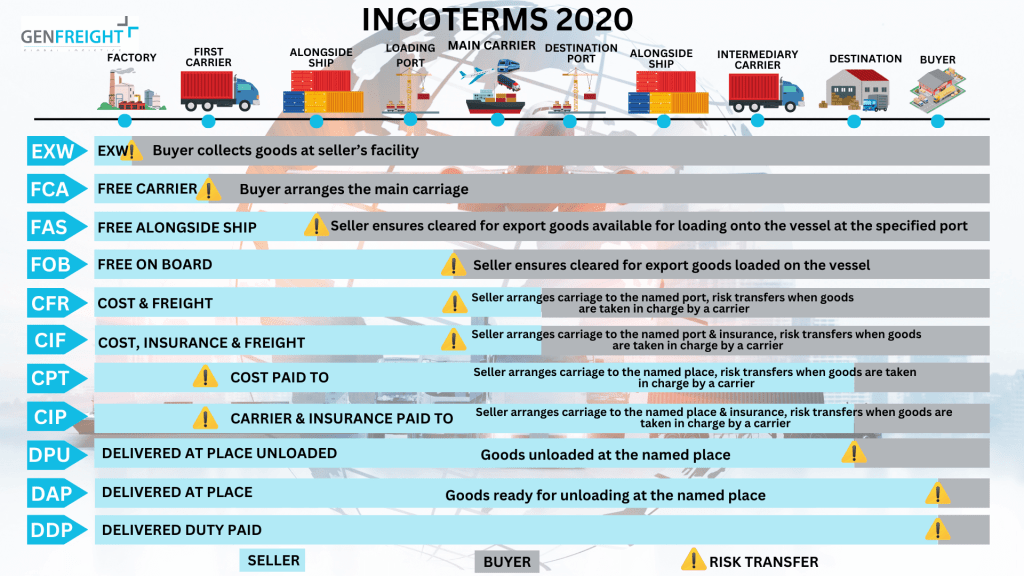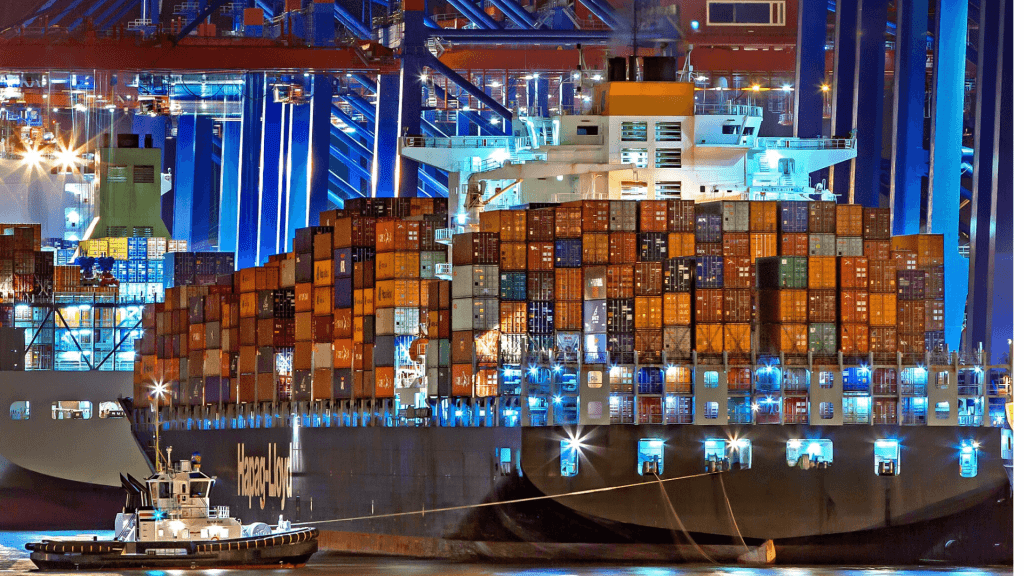Congratulations on taking the plunge into the exciting world of international trade! As an Australian business venturing overseas, navigating the intricacies of shipping and logistics can feel daunting. But let’s take the confusion out of shipping, because Shipping Terms are here to simplify the process. Incoterms, a globally recognised set of international commerce terms, act as a common language for buyers and sellers, clearly defining responsibilities, costs, and risks associated with the transportation of goods.

Choosing the Right Incoterm Can Save You Money: Expert Insight from Genfreight
Incoterm selection can significantly impact your bottom line. This is according to Scott Darmenia, Managing Director at GenFreight, a leading logistics provider in Australia. “A common mistake we see is businesses defaulting to FOB, which can result in unexpected costs at the destination port,” he explains. “By carefully considering factors like Incoterms options and your risk tolerance, we can help you choose the Incoterm that optimises both cost and control for your specific shipment.”
This comprehensive guide, packed with valuable information and up-to-date details, will equip you with the knowledge to confidently navigate Incoterms and ensure a smooth international shipping experience.
Understanding Shipping Terms: A Breakdown of the Essentials
Incoterms are a series of three-letter codes, each representing a specific set of rules that determine:
- When and where the seller hands over the goods to the buyer
- Who is responsible for the costs of transportation
- At what point the risk of loss or damage to the goods transfers from seller to buyer
By clearly outlining these aspects in your sales contract, Incoterms prevent misunderstandings and disputes, saving you time, money, and frustration.
The Latest Incoterms: A Snapshot of Current Practices
The International Chamber of Commerce (ICC) regularly updates ship terms to reflect evolving trade practices. The latest version, Incoterms 2020, is the current standard for international shipping contracts.
A Look at the Different Types of Ship terms
Incoterms come in two main flavors: “any mode” and “sea specific”.
- Any mode (E, F & C terms) work for any transport – road, air or sea. These include things like Incoterms Delivered at Place (DAP) where the seller gets the goods to a location you choose, but doesn’t unload them.
- Sea specific (FAS, FOB, CFR, CIF) are for shipments by sea or inland waterways. These focus on who loads the goods onto the ship and who pays for insurance during transport.
Choosing the Right Shipping Terms for Your Needs
The optimal Shipping Term for your specific situation depends on several factors, including:
- The mode of transport (e.g., sea, air, road)
- The level of control you desire over the shipping process
- Your risk tolerance
- Customs regulations in both the origin and destination countries
A Breakdown of the 11 Shipping Terms Defined Under Incoterms 2020
Here’s a quick overview of each Incoterm to help you make informed decisions:
- EXW (Ex Works): Minimum responsibility for the seller; buyer arranges and pays for all transportation.
- FCA (Free Carrier): Seller delivers goods to a named location, cleared for export; buyer arranges and pays for onward transport.
- CPT (Carriage Paid To): Seller pays for carriage to the named destination, but risk transfers to buyer upon handover to the first carrier.
- CIP (Carriage and Insurance Paid To): Similar to CPT, but seller also obtains minimum insurance coverage for the goods.
- DAP (Delivered At Place): Seller delivers goods to the named place, unloaded, but buyer is responsible for import duties and taxes.
- DDP (Delivered Duty Paid): Maximum responsibility for the seller; seller delivers goods to the named place, cleared for import, and pays all duties and taxes.
- FAS (Free Alongside Ship): Seller places goods alongside buyer’s vessel at the named port of shipment; buyer bears all costs and risks from that point.
- FOB (Free On Board): Seller loads goods onto buyer’s vessel at the named port of shipment; buyer bears all costs and risks from that point onwards. (Note: Due to limitations in verifying cargo condition within containers, FOB is generally not recommended for containerised shipments.)
- CFR (Cost and Freight): Seller pays for carriage to the named port of destination, but risk transfers to buyer upon loading onto the ship at the origin port. Buyer is responsible for unloading costs and import formalities. (Not recommended for all modes of transport; consider CPT instead.)
- CIF (Cost, Insurance & Freight): Similar to CFR, but seller also obtains minimum insurance coverage for the goods. (Not recommended for all modes of transport; consider CIP instead.)
- DAT (Delivered At Terminal): Seller delivers goods, unloaded, at the named terminal at the destination port; buyer is responsible for import duties and taxes and any charges after unloading.
Choosing the Right Incoterm: Valuable Tips for Australian Businesses
Here are some key considerations for Australian businesses selecting the most suitable Incoterms:
- Clearly understand the implications of each Incoterm before entering negotiations with your international trade partner.
- Consider factors such as cost, risk tolerance, and control over the shipment.
- Negotiate the Incoterm that best suits your specific needs and the relationship with your trading partner.
- Clearly define responsibilities and risk transfer points in the sales contract.
Ship Terms and High-Value Goods: A Note of Caution
For Australian businesses shipping high-value goods internationally, extra care is necessary. Here are some recommendations:
- Utilise Incoterms like CIP or DDP that include insurance coverage.
- Negotiate for a higher insurance coverage amount to adequately protect your valuable cargo.
- Consider partnering with a specialised logistics provider with expertise in handling high-value shipments.
Benefits of Using Shipping Terms: A Win-Win Situation

By incorporating Shipping Terms into your international trade contracts, Australian businesses can reap a multitude of benefits:
- Reduced Risk of Disputes: Clear communication regarding responsibilities and risk transfer minimises misunderstandings and costly disagreements.
- Enhanced Efficiency: Streamlined shipping processes through defined procedures lead to faster and more efficient transactions.
- Cost Transparency: Knowing exactly who is responsible for what cost eliminates hidden expenses and ensures accurate budgeting.
- Global Recognition: Incoterms serve as a universal language, facilitating smooth collaboration with international trade partners.
Resources for Australian Businesses
To delve deeper into the world of Incoterms and access valuable resources, Australian businesses can explore these helpful links:
Partner with GenFreight Global Logistics Pty Ltd for Seamless International Shipping
As you navigate the exciting world of international trade, GenFreight Global Logistics Pty Ltd stands ready to be your trusted partner. Our team of logistics experts possesses a wealth of experience and in-depth knowledge of Incoterms. We can guide you through the entire shipping process, ensuring a smooth and successful experience from origin to destination.
Contact GenFreight Global Logistics Pty Ltd today for a free consultation and discover how we can help your Australian business thrive in the international marketplace.
Remember: Incoterms are a powerful tool that can empower Australian businesses to confidently navigate the complexities of international shipping. By understanding and effectively utilising Incoterms, you can ensure a smooth, efficient, and cost-effective international trade experience.
